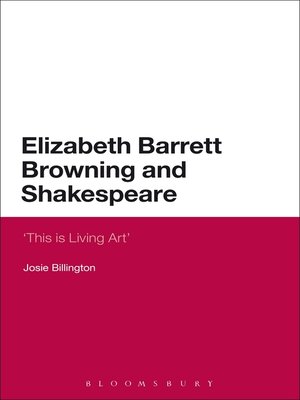Elizabeth Barrett Browning and Shakespeare
ebook ∣ 'This is Living Art' · Continuum Literary Studies
By Josie Billington

Sign up to save your library
With an OverDrive account, you can save your favorite libraries for at-a-glance information about availability. Find out more about OverDrive accounts.
Find this title in Libby, the library reading app by OverDrive.



Search for a digital library with this title
Title found at these libraries:
| Library Name | Distance |
|---|---|
| Loading... |
For most of the twentieth century the exuberant
fluency of Elizabeth Barrett Browning's art was not regarded as worthy of
serious attention. Even the evidence for the swiftness of her wit, thought and
composition remains more impressionistic and anecdotal than firmly proven.
Through close attention to original manuscript material, Josie Billington
argues that Barrett Browning's fast, fine and excitedly vigorous and agile
imaginative intelligence is Shakespearean, both in its power, and in the
creative drive and dynamic to which it gives rise.
Billington contends that for Barrett Browning, as
for Shakespeare, writing was demonstrably a creative event not a second-order
record of experience, and that Barrett Browning's characteristic habits of
composition, and her creative procedure, resemble in significant ways those of
the poet she valued most highly. A fascinating study of both writers' analogous
creative dispositions, minds and modes.
fluency of Elizabeth Barrett Browning's art was not regarded as worthy of
serious attention. Even the evidence for the swiftness of her wit, thought and
composition remains more impressionistic and anecdotal than firmly proven.
Through close attention to original manuscript material, Josie Billington
argues that Barrett Browning's fast, fine and excitedly vigorous and agile
imaginative intelligence is Shakespearean, both in its power, and in the
creative drive and dynamic to which it gives rise.
Billington contends that for Barrett Browning, as
for Shakespeare, writing was demonstrably a creative event not a second-order
record of experience, and that Barrett Browning's characteristic habits of
composition, and her creative procedure, resemble in significant ways those of
the poet she valued most highly. A fascinating study of both writers' analogous
creative dispositions, minds and modes.







